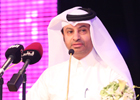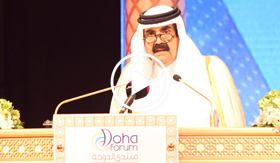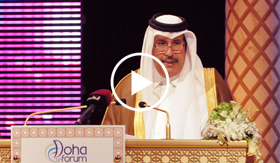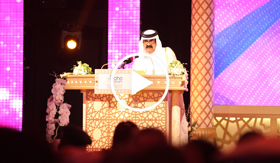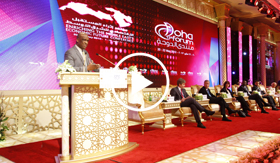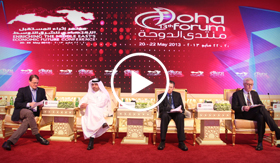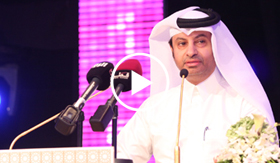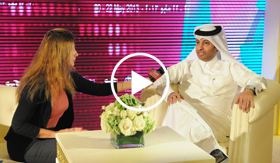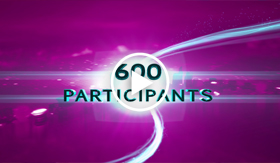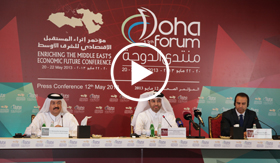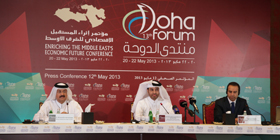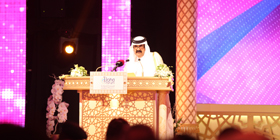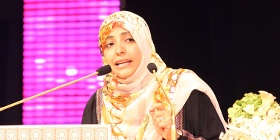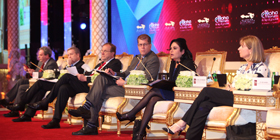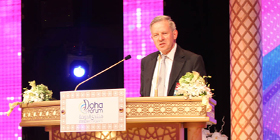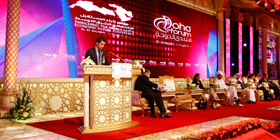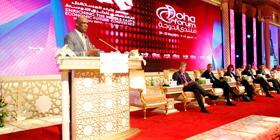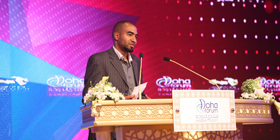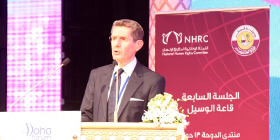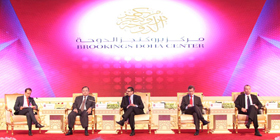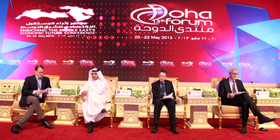


Welcome to the website of the Doha Forum 2013, the leading global conference on international current affairs, now in its 13th year. Held in the presence of His Highness Sheikh Hamad bin Khalifa Al Thani, Emir of the State of Qatar, who will preside over the opening ceremony on May 20th, the forum will commence with an address by His Excellency Sheikh Hamad bin Jassim Al Thani, Prime Minister and Minister of Foreign Affairs.
The 13th Doha Forum draws together political leaders, academics, analysts, representatives of intergovernmental organisations and other members of the foreign policy community to examine pressing issues in the world today as well as key issues in the Middle East of global relevance.
This year's forum will look at:
• The impact of the emerging new world order on the Arab world
• Issues facing the global economy and the impacts on development
• Challenges facing the new democracies in the Middle East
• Prospects for international co-operation and the requirements for success
• The importance of institutional reform in post-Arab Spring
• The repercussions of the global economic crisis on human rights
• The challenges and opportunities offered by digital media – from cyber warfare to digital diplomacy
The 13th Doha Forum will be held at the Ritz Carlton Hotel in the State of Qatar from 20-22 May, 2013. It will be attended by more than 600 participants representing over 80 countries and organisations.
![]() News
News
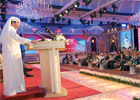
Doha Forum Concludes
The 13th annual Doha Forum came to an end yesterday after three days of discussions held under the theme "Enriching the Middle East's Economic Future".
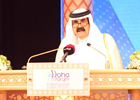
Qatar Emir Opens Doha Forum, Calls For Action On Syria And Israeli-Palestinian Conflict
Doha, 20th May 2013: The Emir of Qatar, His Highness Sheikh Hamad bin Khalifa Al Thani called on the international community to take action to stop a “horrifying tragedy” in Syria that has entered its third year. Addressing the 13th Doha Forum in its opening session, the Emir said the Syrian government continued to pursue a military solution and ignore the “voice of reason”.
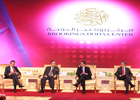
Doha Forum Panellists Compare Experience Of Democratic Transitions In Europe And Consider Pace Of Institutional Reforms In Arab Spring States
Doha, 22 May 2013: European officials speaking at the Doha Forum, in a session organised by the Brookings Doha Center on Wednesday, said European countries that went through democratic transitions like those being witnessed in the Arab world took an inclusive approach to former regime officials and mostly left issues of transitional justice to a later stage.
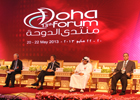
Human Rights Have Suffered Because Of The Global Financial Crisis, Panellists Tell Doha Forum
Doha, 21 May 2013: The international financial crisis that erupted in 2008 has increased conflicts around the world and demonstrated the need to put human rights at the heart of a new global economic system, participants in the Doha Forum said on Tuesday.

Governments Cannot Control Digital Media, Panel Says At Doha Forum
Doha, 21 May 2013: Government efforts to control social media are doomed to fail as a dramatic changes in the world of news and communication create a new public sphere that forces governments to take heed of the views of ordinary people,panellists at the Doha Forum said on Tuesday.
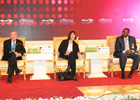
Doha Forum Panel On International Cooperation Says There Is Scope For International Community To Help Arab Countries
Doha 21 May 2013: Doha Forum panellists, discussing the parameters of international cooperation and how that could help the Arab world, outlined avenues for helping countries in transition without interfering in the complex and often fragile processes of change.
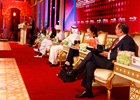
Doha Forum Panel Examines Danger Of Arabs Losing Faith In Democratic Experiments
Doha, 21 May 2013: A panel of experts discussing challenges facing the new Arab democracies said on Tuesday that financial and other help could be needed to stop some countries descending into ungovernability or even a return to the one-party systems brought down by the Arab Spring uprisings.
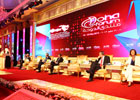
Doha Forum Participants Call For Intervention In Syria, Regional Action To Boost Mideast Economy
Doha, 20th May 2013: Participants in the first discussion panel of this year's Doha Forum, which started in the Qatari capital on Monday, warned of the consequences of allowing the bloodshed in Syria to continue. They also called for more regional action to boost the Middle East economy and global action to tackle the economic and climate problems of an increasingly interconnected world.
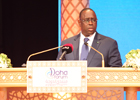
Senegalese President And Tunisian Prime Minister Address 13th Doha Forum
Doha, 20th May 2013:Arab countries should seize the initiative to invest in African countries where economies are growing despite major shifts in the world economy, Senegalese President MackySall said in the Qatari capital on Monday. While Tunisian Prime Minister Ali Larayedhsaid Tunisia was on track to create a new democratic society despite the teething pains of the first years after a rebellion in 2011 that succeeded in ousting former ruler Zain Al-Abidine Ben Ali and set off the Arab Spring uprisings.
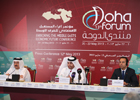
13th Doha Forum to feature heads of state and leading policy experts
Doha, 13th May 2013: The Minister's Assistant for International Cooperation Affairs and Chairman of Qatar's Permanent Committee for Organising Conferences, H.E. Sheikh Ahmed bin Mohammed bin Jabr Al Thani, today announced details of speakers and themes for the upcoming Doha Forum, the 13th to be hosted by the State of Qatar.
![]() Speeches
Speeches

The 13th Doha Forum will be held at the Ritz Carlton Hotel in the State of Qatar from 20-22 May, 2013. It will be attended by more than 600 participants representing over 80 countries and organizations.
Opening speech By His Highness Sheikh Hamad Bin Khalifa Al-Thani, Emir of the State of Qatar. 20-5-2013
Welcoming speech by His Excellency Sheikh Hamad Bin Jassem Bin Jabr Al Thani, Prime Minister and Minister of Foreign Affairs
20-5-2013
1st session – Official opening
The Forum's official opening speech will then by given by His Highness Sheikh Hamad Bin Khalifa Al Thani, Emir of the State of Qatar.
These will then be followed by speeches by our distinguished guests of honour.
2nd session - Arabs and Future Challenges in a Changing World
The Arab world faces a range of challenges and opportunities in its international relationships, particularly with the key international powers of the USA, Europe, Russia, and China who are all seeking to engage with, influence, and profit from the region. These international powers all have different historic relations with the Middle East, varying levels and scopes of engagement, and sometimes conflicting strategies and goals for the future.
As the power and influence of these international partners wax and wane, both in relation to the Middle East and in relation to each other, this session will examine strategies for all these countries and their Middle East partners to manage their relations along mutually beneficial lines. In addition, participants in the session will also discuss the role of civil society, both nationally and internationally, and its impact on governments.
Topics of discussion:
• The US and the Gulf: How to shift from a marriage of convenience to a force for good?
• United States and the challenge of position and status
• Europe and the European structure
• Role of civil society in world governance: Challenges and opportunities
• Russian Federation: Features of Russian power; return to building world status and role, and priorities in this regard
• People's Republic of China: Economy serving foreign policy
3rd session - Global Economy and Development
As the current global economic climate continues to face crises and varying levels of growth and contraction, it presents numerous challenges to international development efforts, which have seen budgets reduce as countries realign priorities. As the 2015 date for the completion of UN Millennium Development Goals (MDG) approaches, this session will examine the effect of the global economy's crisis on trends in international development.
This discussion will examine a number of issues in this area, including the financial instruments available to countries affected by the 'Arab Spring' to assist in economic regeneration and stabilisation, alongside government economic policies and their role in exacerbating, mitigating, and solving the current crises. In addition the session will consider the importance of intellectual property, the north-south divide in economics, and the increasingly powerful voices of women and youth and the challenges and opportunities facing this emerging influential demographic.
Topics of discussion:
• The role of NGOs in the global economy
• Financing instruments in the Arab Spring countries: new trends
• Economic intelligence and intellectual property
• Development indicators in the North-South debate
• Economic policies and the current fiscal crises
• Revisiting the 3rd Arab Economic Summit
• The role of women and youth in the Post-2015 Development Agenda
• Global trends in the global economy
4th session - Democracy: Challenges facing the New Democracies in the Region
The turmoil of the 'Arab Spring' has seen a number of new democracies emerge in the region. However, these states face a number of challenges to their security, stability, and sustainability as new freedoms conflict with old values and varying priorities vie for government attention. These challenges include the struggle to maintain civil rights and security, the pressures placed on new-found freedoms of expression balanced against the need for social cohesion, and the tension between new political systems and historically entrenched value systems.
This session will examine ways for developing democracies to safeguard new rights and freedoms, in addition to respecting national cultures and traditions. It will also explore ways for new governments to reform and revitalise state institutions facing new demands, and ensure that those responsible for the excesses and abuses of the old regimes are held responsible while also working towards reconciliation. Panellists will also discuss strategies to address corruption, poverty, illiteracy, and unemployment, including the engagement of international bodies dedicated to finance and aid to assist in reconstruction and development.
Topics of discussion:
• Building state institutions, rule of law, accountability and constitution
• Safeguarding social, cultural, sectarian and religious cohesion
• Maintaining civil rights - freedom of expression and peaceful protest: People's right to self-determination
• Role of civil society organizations in supporting reform
• Role of international financial institutions/ international aid in development and reconstruction
• Tackling corruption, poverty, illiteracy and unemployment
• Achieving security, stability and reconciliation
5th session - International Cooperation: Prospects for partnership - Challenges and Requirements for success
International cooperation has proven a key driver of both conflict resolution and development throughout the world, including the Middle East. However, the involvement of external powers in the affairs of a nation can lead to negative outcomes with differing strategies and goals coming into competition. In addition, international diplomatic tensions have led to positive examples of international cooperation being dismantled or delayed, leading to stalled development, lost livelihoods, and worsening situations for communities.
This session will discuss strategies to ensure that international cooperation, particularly those involving major powers, remains a positive force, while also examining the diverging strategic interests of several influential countries and their regional partners. Participants will also examine models for institutionalising international cooperation to ensure checks and balances alongside steps to mitigate diplomatic disagreements disrupting otherwise successful programmes. In addition, the roles of the public and private sectors, civil society, and aid agencies in working together and institutionalising cooperation will be debated.
Topics of discussion:
• Conflict resolution and the superpower's diverging strategic interest
• Role of regional and international institutions and organisations in promoting institutionalization of cooperation in order to achieve sustainable development
• Role of aid, assistance and public joint enterprises in development
• Partnership between public and private sectors (PPP) and civil society organisations
• Challenges
6th session - Digital Media
The "Arab Spring" has highlighted the power of digital media to unite disparate voices, empower previously overlooked sections of society, and bring about political and social change. However, events in the Middle East and beyond have also highlighted the threat social media can pose to stability and security, social cohesion, and privacy. These challenges can threaten private individuals, corporations and companies, and governments.
This session will assess the challenges and opportunities this communications revolution presents to countries the world over – particularly on national security with the emergence of cyber warfare. In addition, the emergence of e-diplomacy and social media as a key tool in international relations and communications will be discussed.
Topics of discussion:
• National security and digital media: Challenges or opportunities
• Cyber-security and national security: defence against aggression
• Social media and diplomatic communication
• E-diplomacy: a new emerging trend
• Organizational competency of diplomatic missions in the digital
7th session - National Human Rights Committee Session: The Repercussions of the Global Economic and Financial Crisis of Human Rights
This session will examine the expansion of the global financial and economic crisis and its negative impact on employment, food stability, housing, basic health care and education across the globe. Participants will discuss the private sector's responsibility to protect human rights, the role of international organisations such as the ILO and WTO, lessons learned from other countries, and work towards the UN's Millennium Development Goals.
The expansion of the global financial and economic crisis is now having a negative impact on most of the world's societies, especially in the areas of employment, food stability, housing, basic health care and education. In addition, these societies are witnessing an increase in social problems such as racial discrimination and high crime rates, which, in turn affect security and stability at the local, regional and international levels.
Topics of discussion:
• Social responsibility of the private sector in the field of human rights
• Protection of the rights of migrant workers in light of the current economic crisis
• Role of appropriate international specialized agencies in dealing with the crisis – the International Labor Organization (ILO) as a model
• Mexico as a bridge for immigration: the dual challenge of migrants' human rights
• The effects of the crisis on achieving the Millennium Development Goals (MDGs)
• The World Trade Organization (WTO) and issue of human rights
8th session - Brookings Doha Center Session: Building New Democracies: Institutional Reform after the Arab Spring
This panel discussion, to be hosted by the Brookings Institution's Doha Center, will discuss the challenge of institutional reform in the newly democratic countries of the Arab Spring. As these countries work to reshape the state – including its security, economic, and administrative apparatuses – how should they deal with the pre-revolutionary state and how can they best define their reform goals? How can these countries balance the demand for revolutionary change in state ministries with the need for continuity and stability? Can they introduce new blood to state institutions while retaining those with actual knowledge of how the state functions? And how should they prioritize accountability for the old regime against the requirements of an inclusive process of reform? The panel will discuss the tension that may exist in these transitioning states between revolutionary demands for ground-up reform and the kind of practical moves needed for economic recovery and a functioning state.
Topics of discussion:
• The newly democratic countries of the Arab Spring, including Egypt, Tunisia, and Yemen, are now working to reshape all aspects of the state – including its security, economic, and administrative apparatuses. As they move forward, how should they deal with the pre-revolutionary state and how can they best define their reform goals?
• How can these countries balance the demand for revolutionary change in state ministries with the need for continuity and stability? Can they introduce new blood to state institutions while retaining those with actual knowledge of how the state functions?
• How should they prioritise accountability for the old regime against the requirements of an inclusive process of reform? Is there a tension between revolutionary demands for reform and the practical moves needed for economic recovery and a functioning state?
We are delighted to once again partner with the UCLA’s Centre for Middle East Development for their 8th ‘Enriching the Middle East’s Economic Future’ conference, which will run in conjunction with the Doha Forum 2013.
Over the past eight years, Enriching the Middle East's Economic Future has grown into an internationally recognised forum for scholars, dignitaries, and investors who discuss pressing issues related to global policy as they also conduct private business and interchange.
True to its original title, CMED's conference will offer an overview of issues relating to development and free trade in the Middle East, amongst many other issues with distinguished guest participants including economists, experts, researchers, academics and decision makers from around the world.
This year's debate will embrace a wide range of topical issues divided into 16 workshops across three days.
About the Center for Middle East Development
For more than 20 years, the Center for Middle East Development's (CMED) unique approach has brought together thousands of regional leaders and experts in dialogues structured for productive brainstorming and idea sharing. Participants in CMED's international conferences engage the Middle East's most critical issues, enabling region-wide communication on political, economic, and diplomatic development.
The meetings' unofficial, multilateral format advances long-term change in the region. Problem solving discussions allow participants to think creatively, adjust perceptions, and maintain and expand relationships - regardless of particular political climates. CMED encourages conference participants to ultimately employ new ideas and understanding toward mitigating, preventing, or even ending conflict.
In addition to these conferences, CMED:
• Is an active member of UCLA's renowned International Institute
• Hosts special taskforces on outstanding diplomatic or development challenges
• Maintains several online social networks
• Sponsors a peer-reviewed book series published by Routledge
• Provides students with unprecedented exposure to Middle East culture and problem solving
• Hosts seminars and lectures and sponsors innovative courses at UCLA highlighting key issues in the Middle East
• Provides podcasts, discussion opportunities, and selected monographs
• Supports the highly acclaimed interdisciplinary journal Terrorism and Political Violence, which explores the political dimensions of terrorist activities and a wide range of related issues
• Prepares research projects to promote new concepts on economic development, diplomacy, and arms control in the Middle East
• Hosts a blog, The Middle Easterner, which provides opportunities for UCLA faculty, students, and visiting contributors to express views concerning ongoing Middle East problems and challenges of conflict resolution.
CMED disseminates the innovative policy solutions developed by conference and task force participants through targeted outreach programs to policymakers. By harnessing the collective expertise of these leading regional voices, CMED has become a primary source for authoritative analysis and practical recommendations on the Middle East.
CMED: www.international.ucla.edu/cmed/
UCLA: www.ucla.edu
We are very pleased to announce a new first for this year's forum - the participation of the Brookings Doha Center, whose session will assess a central challenge for post-revolutionary and transition states – that of balancing popular demands for change within key government institutions, with the need for the continuity and stability that will drive economic growth and keep essential parts of the state functioning.
Brookings Doha Center
Based in Qatar, the Brookings Doha Center is an initiative of the Brookings Institution in Washington, D.C. that advances high quality research, independence, and policy impact in the Middle East. The Center maintains a reputation for cutting-edge, field-oriented, independent research on socioeconomic and geopolitical issues facing the broader Middle East, including relations with the United States.
The Brookings Doha Center was formally inaugurated by H.E. Sheikh Hamad bin Jassim bin Jabr Al-Thani, Prime Minister and Minister of Foreign Affairs of the State of Qatar on February 17, 2008.
The Center's International Advisory Council, co-chaired by H.E. Sheikh Hamad bin Jassim bin Jabr Al-Thani and Brookings President Strobe Talbott, provides guidance on programming. Salman Shaikh serves as the Center's director.
In pursuing its mission, the Brookings Doha Center conducts research and programming that engages key stakeholders from academia, business, civil society, government, and media on key public policy issues in the following four core areas:
i) Democratization and political transitions in the Middle East;
ii) Middle East relations with emerging Asian nations, including on the geopolitics and economics of energy
iii) Conflict and peace processes in the region
iv) Educational, institutional, and political reform in the Gulf countries
Open to a broad range of views, the Brookings Doha Center is a hub for Brookings scholarship in the region.
BDC: www.brookings.edu/about/centers/doha
Brookings: www.brookings.edu/
![]() Press News
Press News

The 13th Doha Forum will be held at the Ritz Carlton Hotel in the State of Qatar from 20-22 May, 2013. It will be attended by more than 600 participants representing over 80 countries and organizations.
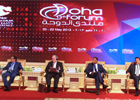
The 13th Doha Forum will be held at the Ritz Carlton Hotel in the State of Qatar from 20-22 May, 2013. It will be attended by more than 600 participants representing over 80 countries and organizations.
![]() Documents
Documents

